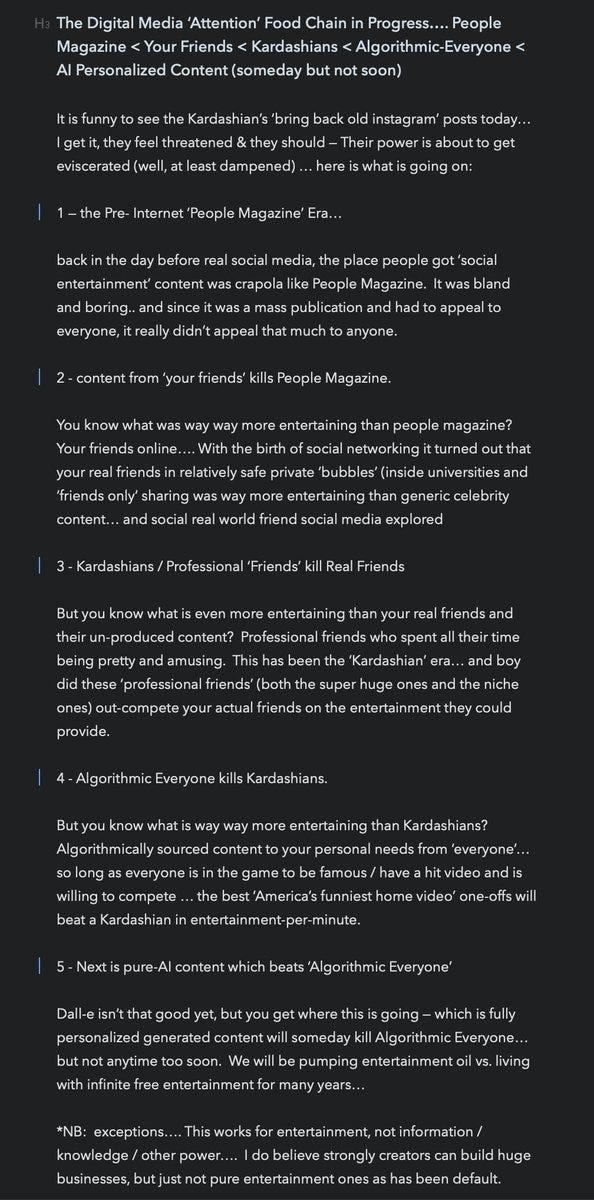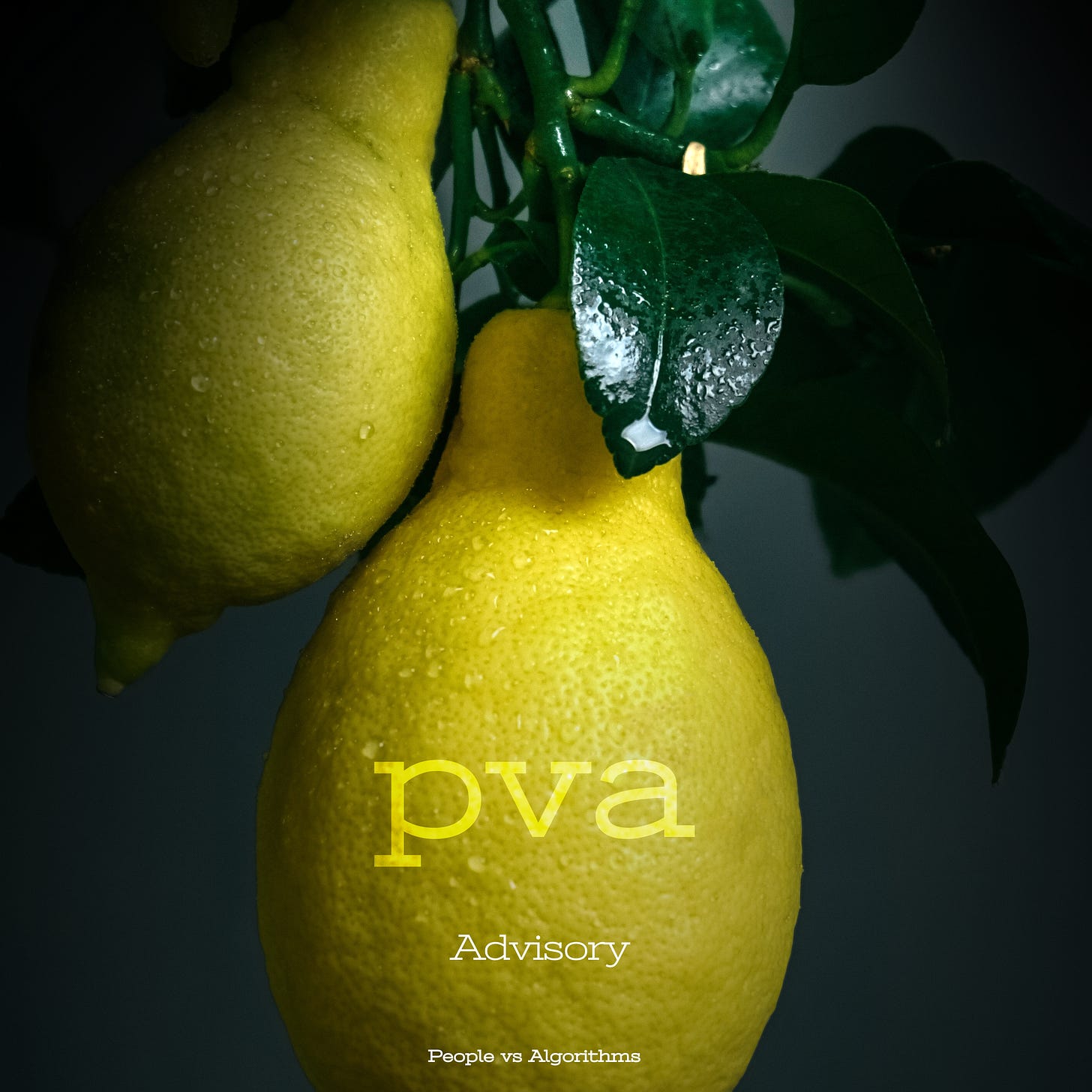Welcome to People vs Algorithms #37.
I look for patterns in media, business and culture. My POV is informed by 30 years of leadership in media and advertising businesses, most recently as global President of Hearst Magazines, one of the largest publishers in the world.
It was an unusual reply to the most American of questions. I try not to ask it, at least not immediately after meeting someone. But he went there first.
“So, what do you do?” he asked. I replied with a non-specific “I work in media and stuff. How about you?” “We are influencers” was his reply. He was delighted to bump into someone familiar with the terrain and eager to engage.
My family and I were spending a couple of days in the suffocating Miami heat. I had struck up a conversation with a middle-aged influencer-dad lounging in the hotel pool. I mean he was sort of an influencer. More of a part time influencer and full time influencer business manager. I would later discover that he was part of an “influencer family” who were, unbeknowst to us, deep in the act of media creation in and around the pool loungers that muggy afternoon.
We had a lovely conversation. I had never really spent time with someone from an influencer family before. And this particular one seemed to be making a good go of it.
Seeking relief from the Canadian cold during Covid, as well as a better backdrop for influencer storytelling, his posse beelined to Miami, never to return to the North. A fast growing Instagram account had evolved into a successful boutique media business. They were doing 20 campaigns a month for reputable fashion brands. Campaigns averaged $35k a pop. Eight people now supported the business with video editing, sales operations and client service. This was an influencer operation that had crossed over from hobby to a real business. Eponymous fashion and housewares lines were up next.
Another friendly Canadian quickly recognized him in the pool and offered a courteous “Hello!… we are from Toronto and we follow your wife on social media!” Evidence that this influencer stuff works.
Like many influencers, the content's scope and ambition had expanded wildly from Mom’s early first-person style posts. The entire family filled out the cast. Posts became more strategic and started to include wellness, lite self-help and interpersonal family shenanigans. While we were talking, the eldest child, about nine years old, interrupted to remind his dad to tag the hotel in an Instagram post. All the world’s a stage!
Naturally, my wife and I later fell into a brief voyeuristic social media sinkhole trying to understand what it might be like to live life as an influencer family and why anyone might want to do it. I of course recognized this as a perfect lede for a note about the shift happening in social media culminating into the full TikTok inspired convergent moment.
Two decades of innovation in social networking, mobile technology, content creation tools, algorithms, AI, user experience has converged in a singular feed of video. It should come as no surprise that an interface-free video experience would subsume social media. People love video. It just took a little time to get everybody to this point. What is perhaps more surprising, is what it is doing to the people that create media, like the family I met at the pool.
Media culture has evolved to embrace the individual creator on the same playing fields as a media brand. The video feed does not discriminate between personal and institutional. It’s all just content, the most engaging and entertaining wins.
Now everyone wants to be like TikTok. Meta’s strong handed maneuverings to respond to the threat has created an endless amount of media chatter. The short version is this. News is troublesome. Creator-driven video is entertaining. Particularly when delivered in an effortless stream, algorithmically personalized and detached from the humdrum of your friend networks. There’s a place for personal interaction, but increasingly these are small intimate groups, built on conversation and detached from the social media stream. There’s a new Facebook tab for that. Or group chat. Or Discord. Maybe Reddit.
Media is a game of intent and attention. The most valuable platforms dominate one or the other. Few win at both. On the internet, our intent is funneled into commercial action. It’s a performance equation driven by links — precisely measurable and priced according to downstream value. Intent is a toll booth. Google and now Amazon are the dominant forces here. Judging from Google’s Q2 results, the business is holding up better than most.
Attention is best captured with video. Video demands your time — when it gets it, everyone wants a part of it. Advertisers like video even more than people. It sells like oil. As an ad environment it’s less dependent on contextual alignment and ruthless short-term ROI optimization.
Finding opportunities to intercept the audience with video messages is obviously far harder in on-demand digital environments than linear TV. TikTok has unwittingly produced the next great advertising platform combining the storytelling power of video, segmentation sophistication of social networking, the intimacy of the creator shill and an environment where consumers effortlessly move from content to ads and back to content. Or maybe the distinction between the two no longer even matters.
Needless to say, owning the video feed is beyond valuable. The battle is putting pressure on Snap. YouTube can feel it too. Twitter was never close to having it and never had intent either which is why they are where they are. For Meta it’s existential. They cannot afford to lose the attention game. Facing backlash from users that just want the old picture-driven experience back, Instagram’s head Adam Mosseri was forced to come clean: “I need to be honest — I do believe that more and more if Instagram is going to become video over time.”
The interesting thing about app-driven companies like Meta is change pivots around a single, controllable customer touch point. A take-no-prisoners product-minded CEO stands between the TikTok threat and a fast-follower product strategy. The company can turn very quickly, unlike, say, complex service organizations, B2B or consumer product companies. The complexity of change lands, instead, with the ecosystem of users whose livelihood depends on the predictability of audience from the system. Zuck has long understood this dynamic and has managed the company accordingly. His singular ability to pivot the organization is unmatched. There will be influential and vocal stakeholders like the Kardashians who protest changes that threaten their dominant positions on the platform, but these will not undermine strategy shifts. Publishers know this too well.
Unsurprisingly, Meta’s head of global news partnerships, Campbell Brown, just announced the deprioritization of the News tab and Bulletin, the newsletter platform and Substack imitator. The former involves managing a loud and hostile constituency of news publishers whose economic and traffic expectations can never be satisfied. News has never been great for ad monetization. Certainly not in the digital age.
The latter was an inconsequential competitive play to get in front of the newsletter craze. Remember, Substack, the newsletter category leader, is a $10-20M dollar flea of a business. The subscription market for newsletters is tiny relative to a global marketplace for video-driven attention. What’s up for grabs is everything that sits between news and long-form entertainment. This is an enormous piece of the attention spectrum encompassing much of what previously known as magazine media and, increasingly, discretionary time that was spent watching TV.
And there’s another very important benefit of sitting at the center of a creator-driven video economy, one that sits in sharp contrast to managing the relationships with large media companies. Creators exist to feed the platform. Media partners want the platforms to feed them.
It’s illustrative to listen to creators talk about the nuances of creating for various video environments. They approach the challenge with a game-like mindset, obsessing over how to master the platform specific audience and algorithmic quirks. Thousands of them compete for attention with little economic leverage or outsized political influence. Monetization is a delightful reward, not an expectation. Some, like the influencer family above, rise above creator and emerge as media brands. Mostly, platforms cycle through them like players on a game leaderboard.
Would you rather be the global center for millions of creators each with little media power and low expectations or an interface for angry news organizations who resent you exist? One has a delicious video ad model. The other has regressed to low yield response ads. The answer is pretty easy.
What does all of this say about the media world more broadly? A few observations...
Video was once an expensive option for text-based media organizations. Increasingly it’s central. By now it's pretty obvious that media is a game of platform optimization. Google is a lifeline for text based publishers. SEO is the priority. Virtually everything else has become about short form video — TIkTok, Instagram, Snap, Facebook, obviously YouTube. The ability to create it quickly and cheaply, to nurture talent to front your efforts and compete with influencers and the capacity to bridge commercial and editorial objectives is central to everyone who wants to build an audience outside of search.
The “still” image doesn’t stand a chance. Nothing will replace a photo’s ability to freeze a moment. We may pine for days of the photo-driven Instagram. But they just don’t compete with video, for attention or ad dollars. Increasingly photos look like a vinyl record.
Creators are the ultimate lean media businesses. They dodge the cost structure of traditional media and soak up the talent fees. Media companies will continue to feel price pressure from this nimble competitor. An insistence on content efficiency will not abate.
Follower count has been the currency of social success for years. It will continue to be an input into viewership, but increasingly content success matters more. Algos trump followers. This is good news for some, bad for others. Followers provided some semblance of permanent distribution for media brands. Increasingly pleasing the algorithm matters more. Successful content travels quickly, irrespective of social standing. Secrets of "pleasing the algorithm” will persist as media’s dark art.
What’s clear is a tougher economic environment and competitive pressure are forcing dramatic changes on the world's dominant social media companies. The whole space is incredibly unstable right now. As I sit here typing, Meta is reporting the first quarterly YOY revenue drop in the company’s history. Expect aggressive moves to return to a growth footing.
Snap’s trajectory is hard to predict. It’s a capable product company with a likeable brand. But it’s core messaging offering feels harder to protect and its media experience feels old fashioned next to TikTok. Certainly, both Snap and Meta dream of an AR/VR future for fresh competitive terrain. Needless to say, there’s a hungry new constituency at the ad buying table and portions are going to get smaller.
TikTok’s treacherous position as a Chinese-owned company only adds to the unpredictability of our current state. Not to mention Twitter insanity…. and an embattled Pinterest. These are uncertain times in platform land.
It’s profound for me to watch the industry pivot around TikTok. Seven years ago I was in Musical.ly’s (TikTok’s predecessor) Santa Monica office working on a partnership to have Hearst’s young women’s brands like Cosmopolitan and 17 more actively participate on the platform. Musical.ly had become a thing with teen girls, who loved how the simple video creation tools combined with licensed music catalog enabled the creation of lip-sync videos. At the time it was hard to imagine how the phenomenon would transcend a narrow demographic. A couple of years later, after a ByteDance acquisition, the rebrand to TikTok and algorithmic innovation that delivered instant gratification to a new user, the application began to redefine the digital media experience. The product was compelling, but it was hard to imagine how it would challenge a dominant Instagram.
Of course, the product itself is a small part of the equation. It’s the community of creators that really matters. People like the influencer family are the fuel that make these engines run. The next generation of social platforms could care less if your personal network is signed up and more about the vibrancy of a indentured creator class that that can be endlessly funneled into the video feed. Like media, social platforms are generational. Social is shifting from connections to entertainment. The next gen wants their MTV.
Have a great weekend…. / Troy
Related:
1. Sam Lessin does a decent job of breaking down the past, present and far future./ Twitter


2. There’s no going back. Time to build something new. “You don't want the old Instagram” / Taylor Lorenz, Substack
People think that bringing back the "old" Instagram design, or a chronological feed will somehow recapture the magic of using Instagram in 2014. It won't. That time is gone and the internet and culture have irrevocably changed. Most importantly, how and what we want to share on the internet has changed.
3. How is the algorithm influencing you? The Age of Algorithmic Anxiety / New Yorker
Peter’s dilemma brought to my mind a term that has been used, in recent years, to describe the modern Internet user’s feeling that she must constantly contend with machine estimations of her desires: algorithmic anxiety. Besieged by automated recommendations, we are left to guess exactly how they are influencing us, feeling in some moments misperceived or misled and in other moments clocked with eerie precision. At times, the computer sometimes seems more in control of our choices than we are.
4. What happens when you take the news from the feed. It might make you happy. The Horrors of No-News Facebook / The Atlantic
As the company renovates and overhauls its user experience in an effort to regain relevance, it could be getting closer and closer to the newsless alternate universe that Roy and others have created in experiments. Facebook used to emphasize its role as a protector of democracy and as a vital news source. The new era looks to be about something simpler: Have a nice day! Have a nice day! Have a nice day!
5. Meta sees a different future than Apple. “Zuckerberg says Meta and Apple are in ‘very deep, philosophical competition’ to build the metaverse” / The Verge
“This is a competition of philosophies and ideas, where they believe that by doing everything themselves and tightly integrating that they build a better consumer experience,” Zuckerberg said of the brooding rivalry. “And we believe that there is a lot to be done in specialization across different companies, and [that] will allow a much larger ecosystem to exist.”







